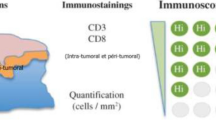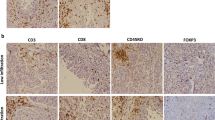Abstract
Background
Increasing evidence suggests that cancer progression is strongly influenced by the host immune response, which is represented by immune cell infiltrates. The T-lymphocyte-based Immunoscore is reported to be a reliable prognostic factor in colon cancer, but its significance in urothelial carcinoma of the bladder (UCB) is at an early stage of exploration. This study aimed to determine whether the tumor immune infiltrate, as evaluated by the Immunoscore, could act as a useful prognostic marker for UCB patients who have undergone radical cystectomy (RC).
Methods
In this study, immunohistochemistry was used to examine the Immunoscore of 221 UCB patients who underwent RC. The Immunoscore of the patients was determined by the densities of CD3+ and CD8+ T cells at the tumor center and the invasive margin.
Results
A highly significant association between a low Immunoscore and a shortened patient survival (P < 0.001, log-rank test) was demonstrated. In different subsets of UCB patients, a low Immunoscore also was a prognostic indicator of pT ≤ 2, pN(–)-status tumors, negative vascular invasion, or both (P < 0.05). Importantly, the Immunoscore together with the patient’s pT status provided significant independent prognostic parameters in the multivariate analysis (P < 0.05). Furthermore, a significant correlation (P = 0.003) of a low Immunoscore with an increased UCB labeling index of Ki-67 (a cell proliferation marker) was observed in this UCB cohort.
Conclusions
The findings suggest that the Immunoscore, as examined by immunohistochemistry, might serve as a novel prognostic marker for UCB patients who have undergone RC.



Similar content being viewed by others
Availability of Data and Materials
The key raw data have been deposited into the Research Data Deposit (http://www.researchdata.org.cn), with the approval number of RDDB2019000530.
Change history
22 November 2019
In the original article, the word IMMUNOSCORE<Superscript>®</Superscript> was not displayed to reflect its trademark status. At every mention, IMMUNOSCORE<Superscript>®</Superscript> should be in all caps and with a registered trademark symbol.
References
Jacobs BL, Lee CT, Montie JE. Bladder cancer in 2010: how far have we come? CA: Cancer J Clin. 2010;60:244–72.
Abdollah F, Sun M, Schmitges J, et al. Stage-specific impact of pelvic lymph node dissection on survival in patients with non-metastatic bladder cancer treated with radical cystectomy. BJU Int. 2012;109:1147–54.
Witjes JA, Comperat E, Cowan NC, et al. EAU guidelines on muscle-invasive and metastatic bladder cancer: summary of the 2013 guidelines. Eur Urol. 2014;65:778–92.
Sternberg CN, Bellmunt J, Sonpavde G, et al. ICUD-EAU international consultation on bladder cancer 2012: chemotherapy for urothelial carcinoma-neoadjuvant and adjuvant settings. Eur Urol. 2013;63:58–66.
Stein JP, Lieskovsky G, Cote R, et al. Radical cystectomy in the treatment of invasive bladder cancer: long-term results in 1054 patients. J Clin Oncol. 2001;19:666–75.
Herr HW, Faulkner JR, Grossman HB, et al. Surgical factors influence bladder cancer outcomes: a cooperative group report. J Clin Oncol. 2004;22:2781–9.
Brierley JD, Gospodarowicz MK, Wittekind C. TNM classification of malignant tumors. UICC International Union Against Cancer. 8th ed. Chichester, UK: Wiley-Blackwell; 2017.
Prasad SM, Decastro GJ, Steinberg GD. Urothelial carcinoma of the bladder: definition, treatment, and future efforts. Nat Rev Urol. 2011;8:631–42.
Redelman-Sidi G, Glickman MS, Bochner BH. The mechanism of action of BCG therapy for bladder cancer: a current perspective. Nat Rev Urol. 2014;11:153–62.
Slovin SF. Biomarkers for immunotherapy in genitourinary malignancies. Urol Oncol. 2016;34:205–13.
Krpina K, Babarovic E, Dordevic G, Fuckar Z, Jonjic N. The association between the recurrence of solitary non-muscle invasive bladder cancer and tumor-infiltrating lymphocytes. Croat Med J. 2012;53:598–604.
Baras AS, Drake C, Liu JJ, et al. The ratio of CD8 to Treg tumor-infiltrating lymphocytes is associated with response to cisplatin-based neoadjuvant chemotherapy in patients with muscle invasive urothelial carcinoma of the bladder. Oncoimmunology. 2016;5:e1134412.
Sjodahl G, Lovgren K, Lauss M, et al. Infiltration of CD3(+) and CD68(+) cells in bladder cancer is subtype specific and affects the outcome of patients with muscle-invasive tumors. Urol Oncol. 2014;32:791–7.
Galon J, Mlecnik B, Bindea G, et al. Towards the introduction of the “Immunoscore” in the classification of malignant tumours. J Pathol. 2014;232:199–209.
Mlecnik B, Van den Eynde M, Bindea G, et al. Comprehensive intrametastatic immune quantification and major impact of Immunoscore on survival. J Natl Cancer Inst. 2018;110:97–108.
Jiang Y, Zhang Q, Hu Y, et al. ImmunoScore Signature: a prognostic and predictive tool in gastric cancer. Ann Surg. 2018;267:504–13.
Anitei MG, Zeitoun G, Mlecnik B, et al. Prognostic and predictive values of the immunoscore in patients with rectal cancer. Clin Cancer Res. 2014;20:1891–9.
Tahkola K, Mecklin JP, Wirta EV, et al. High immune cell score predicts improved survival in pancreatic cancer. Virchows Arch. 2018;472:653–65.
Pages F, Mlecnik B, Marliot F, et al. International validation of the consensus Immunoscore for the classification of colon cancer: a prognostic and accuracy study. Lancet Lond Engl. 2018;391:2128–39.
Ingels A, Sanchez Salas RE, Ravery V, et al. T-helper 1 immunoreaction influences survival in muscle-invasive bladder cancer: proof of concept. Ecancermedicalscience. 2014;8:486.
Yu A, Mansure JJ, Solanki S, et al. Presence of lymphocytic infiltrate cytotoxic T lymphocyte CD3+, CD8+, and immunoscore as prognostic marker in patients after radical cystectomy. PloS ONE. 2018;13:e0205746.
Marisa L, Svrcek M, Collura A, et al. The balance between cytotoxic t-cell lymphocytes and immune checkpoint expression in the prognosis of colon tumors. J Natl Cancer Inst. 2018;110:68–77.
Mlecnik B, Bindea G, Kirilovsky A, et al. The tumor microenvironment and Immunoscore are critical determinants of dissemination to distant metastasis. Sci Transl Med. 2016;8: 327ra326.
Gabrielson A, Wu Y, Wang H, et al. Intratumoral CD3 and CD8 T cell densities associated with relapse-free survival in HCC. Cancer Immunol Res. 2016;4:419–30.
Vayrynen JP, Vornanen JO, Sajanti S, Bohm JP, Tuomisto A, Makinen MJ. An improved image analysis method for cell counting lends credibility to the prognostic significance of T cells in colorectal cancer. Virchows Arch. 2012;460:455–65.
Yoon HH, Shi Q, Heying EN, et al. Intertumoral heterogeneity of CD3(+) and CD8(+) T cell densities in the microenvironment of DNA mismatch-repair-deficient colon cancers: implications for prognosis. Clin Cancer Res. 2019;25:125–33.
Li XD, Chen SL, Dong P, et al. Overexpression of RNF2 is an independent predictor of outcome in patients with urothelial carcinoma of the bladder undergoing radical cystectomy. Sci Rep. 2016;6:20894.
Torre LA, Bray F, Siegel RL, Ferlay J, Lortet-Tieulent J, Jemal A. Global cancer statistics, 2012. CA Cancer J Clin. 2015;65:87–108.
Sternberg CN, Skoneczna I, Kerst JM, et al. Immediate versus deferred chemotherapy after radical cystectomy in patients with pT3-pT4 or N+ M0 urothelial carcinoma of the bladder (EORTC 30994): an intergroup, open-label, randomised phase 3 trial. Lancet Oncol. 2015;16:76–86.
Streeper NM, Simons CM, Konety BR, et al. The significance of lymphovascular invasion in transurethral resection of bladder tumour and cystectomy specimens on the survival of patients with urothelial bladder cancer. BJU Int. 2009;103:475–9.
Grivennikov SI, Greten FR, Karin M. Immunity, inflammation, and cancer. Cell. 2010;140:883–99.
Spranger S, Gajewski TF. A new paradigm for tumor immune escape: beta-catenin-driven immune exclusion. J Immunother Cancer. 2015;3:43.
Liu C, Peng W, Xu C, et al. BRAF inhibition increases tumor infiltration by T cells and enhances the antitumor activity of adoptive immunotherapy in mice. Clin Cancer Res. 2013;19:393–403.
Lanaya H, Natarajan A, Komposch K, et al. EGFR has a tumour-promoting role in liver macrophages during hepatocellular carcinoma formation. Nat Cell Biol. 2014;16:972–7.
Angelova M, Mlecnik B, Vasaturo A, et al. Evolution of metastases in space and time under immune selection. Cell. 2018;175:751–65.e716.
Acknowledgment
This work was supported by funds from the Nature Science Foundation of China (Nos. 81772716 and 81472385) and the Science and Technology Planning Project of Guangdong Province (No. 2017B020227007).
Author information
Authors and Affiliations
Contributions
HML, ZWL and XDL designed the research and wrote the paper. XDL, CWH, ZFL, LJJ, HML and FJZ analyzed data and prepared figures. CWH, LJJ, JWC and DX advised on the research design and collected the clinical information. ZWL finalized the paper for submission. All authors read and approved the final manuscript.
Corresponding authors
Ethics declarations
Disclosure
The authors declare that they have no conflict of interest.
Additional information
Publisher's Note
Springer Nature remains neutral with regard to jurisdictional claims in published maps and institutional affiliations.
Rights and permissions
About this article
Cite this article
Li, XD., Huang, CW., Liu, ZF. et al. Prognostic Role of the Immunoscore for Patients with Urothelial Carcinoma of the Bladder Who Underwent Radical Cystectomy. Ann Surg Oncol 26, 4148–4156 (2019). https://doi.org/10.1245/s10434-019-07529-y
Received:
Published:
Issue Date:
DOI: https://doi.org/10.1245/s10434-019-07529-y




